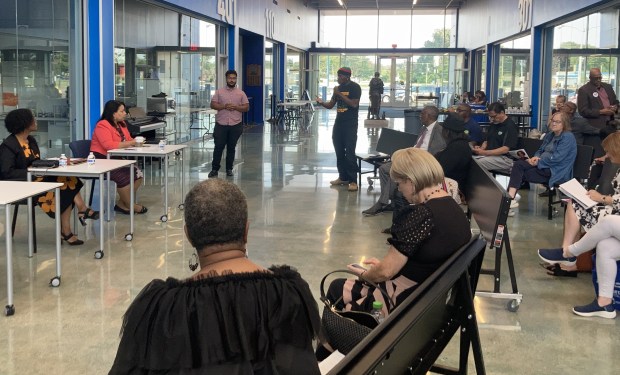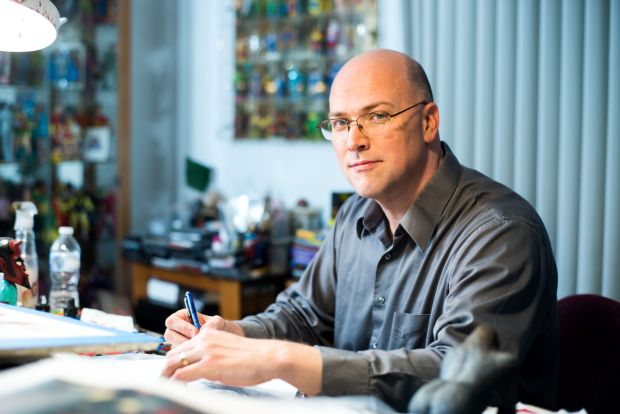For more than two years, state Rep. Rita Mayfield, D-Gurnee, has worked to pass legislation requiring NRG Generation to remove two coal ash ponds at its Waukegan generating station rather than cover them.
Initially introduced in the 102nd Illinois General Assembly in 2022, the bill easily passed the State Senate, but Mayfield was unable to muster a majority in the House.
Introducing the proposed law again shortly after the 103rd General Assembly opened early last year, Mayfield has continued to work with her colleagues to get the commitment of a majority of 60 members.
“We’re five votes short,” she said. “Every time we take a step forward, it seems we take two steps back.”
Coal ash was one of several issues discussed at a town hall hosted by state Sen. Adriane Johnson, D-Buffalo Grove, state Rep. Daniel Didich, and Mayfield Monday in Waukegan to report to the public and hear from their constituents.
Between the opening of the current legislative session in January and its adjournment on May 29, Johnson talked about laws impacting maternal health, education, infrastructure, the state passing its sixth consecutive balanced budget and more.
Not specifically naming NRG in the legislation, the proposed law requires all coal ash ponds in Illinois along Lake Michigan to remove them, and take away all contaminants which may be present.
Though Mayfield talks about the coal ash bill frequently, one member of the public asked her why she could not muster the necessary votes when the Democrats have a “super, super majority” in the House. She said it was not that simple.
“We don’t all vote in unison. We all represent distinct districts,” Mayfield said. “They have coal plants in their districts,” she added, referring to Democrats unwilling to vote for the bill. “They don’t want them closed. They don’t want to lose the jobs.”
Ann Duhon, NRG’s senior manager for generation communications, said in an email Tuesday the company will comply with all state and federal laws, but the proposed legislation singles out NRG.
“State legislation disregards existing federal and state regulatory programs that unfairly single out one company at one location for unfair treatment,” she wrote. “The recommended plans (of NRG) are based on analysis and modeling that makes protecting the community and the environment a priority.”
Waukegan Mayor Ann Taylor, who has made numerous, trips to Springfield to speak to legislators in favor of the bill, said she hears from members of the legislature some do not want the residue trucked to their areas.
“The problem is, where does it go?” she said. “They are all for removing the ponds, but they don’t want it in their district.”
During the meeting, Johnson said she was pleased with the work she did on a pregnancy postpartum care bill passed on the last day of the session and sent to Gov. J.B. Ritzier on June 21.

Requiring insurers in Illinois to cover, “all services for pregnancy, postpartum and newborn care,” according to the legislation, Johnson said it would significantly reduce risks to the health of both the mother and child.
“Every woman deserves to leave the hospital with a child who is alive and well,” she said. “Maternal health is a right.”
Several people at the town hall wanted to know what the legislators were doing about the teacher shortage in Illinois, particularly in places like Waukegan and North Chicago where pay is lower because of budget constraints.
Mayfield talked about a law she championed where funding is set aside for teacher recruitment. Grants are being issued.
When North Chicago School District 187 needed special legislation to be able to hold a referendum to pay for 20% of the cost of building a new Forrestal Elementary School — the other 80% is coming from the federal government — Johnson said she made sure it was approved.
Built in the 1950s, Johnson said the Forrestal renovation is no longer a cost-effective nor a responsible solution. Neither students nor staff can use the drinking fountains because the water is not safe to drink.
“The health of students should never be at risk,” she said after the meeting. “This measure gives the school district relief from the standard process, which will ensure students return to a safe learning environment in the most expeditious manner.”
Among other items in the budget, Johnson said $10 million is available in grant money for people to open new or improve existing grocery stores in areas considered food deserts, like the 10th Street corridor separating Waukegan and North Chicago.
“It’s an incentive for people to open grocery stores in underserved areas of Illinois,” Johnson said. “If they already have one, they can use the money to improve their store.”
After another member of the public asked whether Full House Resorts was ever going to open a permanent casino to replace The Temporary at American Place it operates in Waukegan, Didich said the state was taking action to ensure it will.
“There are issues beyond their control,” he said, referring to litigation between the state, the city of Waukegan and the Forest County Potawatomi Community, which does not include Full House
”They have three years to build a permanent casino, and the state extended it to 4½ years,” Didich added. “If needed, the Illinois Gaming Board will take some kind of action.”





